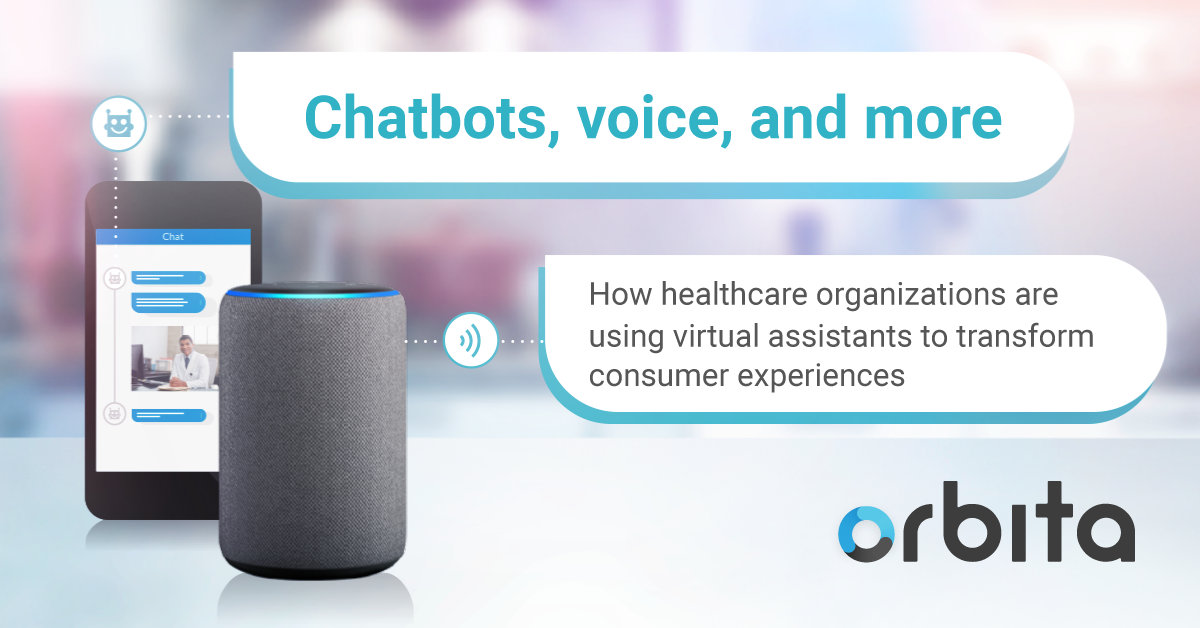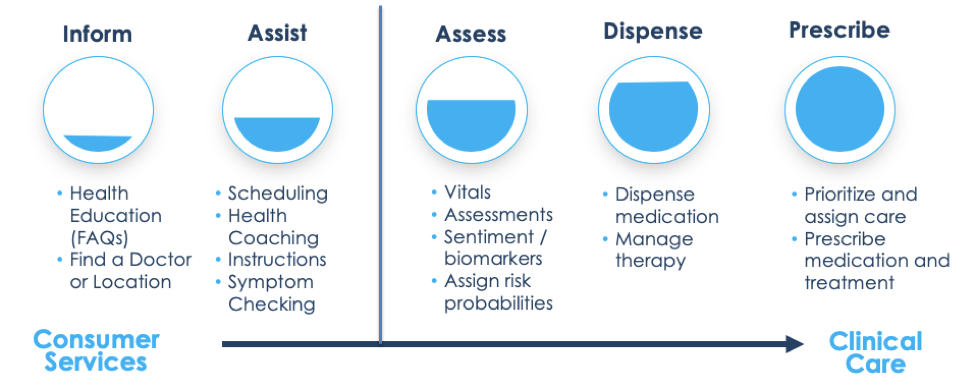
Chatbots, Voice, and More: How Healthcare Providers are Using Virtual Assistants to transform Consumer Experiences
In recent webinars and blog posts, we’ve discussed Amazon’s HIPAA announcement and how it will impact virtual assistants in healthcare.
Healthcare virtual assistants can be organized along a spectrum from consumer services to clinical care, with varying security requirements. In this blog post, we’ll focus on virtual assistants that support consumer services – these fall into the Inform and Assist categories along this spectrum.
The difference between the two ends of this particular spectrum is that those to the right of the vertical line require Protected Health Information (PHI) to be useful. They also need to comply with HIPAA guidelines. The virtual assistants to the left of the dividing line provide valuable and helpful information without the need to handle PHI or ensure HIPAA compliance.
Why should healthcare organizations care about virtual assistants?
In recent years, we’ve seen the rise of a trend that can be described as the "consumerization of healthcare."
By that, we mean considering the patient as a consumer and empowering them to seek and find the information they need, when they need it, and through their preferred information medium or channel. Some examples include opportunities for patients to easily find the right specialist for their needs and schedule medical appointments without needing to get on a phone— and the ability to get answers to treatment questions without needing to see a physician.
Through conversational AI technology, voice and chatbot virtual assistants create valuable opportunities for healthcare organizations to optimize the way they engage with patients while also creating business efficiencies and reducing expenses.
These technologies help facilitate patient experiences that are intuitive and conversational, available at all times, and accessible through any preferred channel or platform.
With virtual assistants, healthcare organizations can offer their patients a way to find answers to questions they may have without needing to actually speak to a doctor or a nurse. Organizations that use virtual assistants to field and answer commonly-asked questions by patients have the potential to significantly reduce wait times for their existing patients and accept new patients more easily.
Making health information available through virtual assistants
During a previous webinar, we talked about how Mayo Clinic has evolved the delivery of their content through a virtual assistant. One of their biggest challenges as they migrated to voice was how to use their existing information without duplicating it, and ultimately avoid errors and inconsistencies. Virtual assistants such as Mayo Clinic’s fall into the Inform category along the spectrum (see image above) since they do not need access to the user’s PHI to provide value.
Moving further right along the spectrum, coaching patients is an excellent use of a virtual assistant within the Assist category. Here, the content is fairly straightforward to define and deliver. Coaching virtual assistants can be used, for example, to guide a patient through a session of using a spirometer to keep lungs clear at home post-surgery. Depending on the device used to interact with the virtual assistant, the coaching content can be enhanced with how-to videos that the patient can access to enhance the experience.
Leveraging the right people and the right technology
While designing and developing a virtual assistant, it’s essential to take a few things into consideration. For example, through which channels will a patient use the tool? Will it be a chatbot experience or a voice experience? Or both? Who will supply the content? How will the content be managed? Who will be the final judge of what answers and information to provide: the computer or the clinician?
The decision on which channels to use will be made as a team (business leaders, designers, and developers), but other considerations fall to members of the team who are less likely to be tech-savvy. How can the knowledge possessed by the business owners be integrated into the development of a virtual assistant— for example, in the above use case— how to use a spirometer?
To help healthcare organizations and team members interact with and contribute to the conversational design process, Orbita offers Orbita Flow. In Orbita Flow’s no-code environment, non-technical and technical employees alike can quickly build powerful voice and chatbot applications using ready-made controls and pre-built templates.
Another design and implementation consideration that needs to be evaluated is how the system decides what information will to be provided through the virtual assistant. As noted, virtual assistants rely on AI - and AI makes the technology a reality. However (and this is especially true for healthcare virtual assistants), AI cannot be solely responsible for determining what content is presented when a patient asks a question. Doing so may result in a virtual assistant giving incorrect and potentially harmful information (see: Alexa, Siri NLP Skills Not Ready for Reliable Medical Conversations).
The Orbita Answers offers this capability and is designed for use by non-technical team members.
The Orbita platform has other elements that are better-suited for more technical team members. Developers can define conversational logic, interface with third-party services, and extend base capabilities using Experience Designer, a low-code interface for voice and chat-powered and conversational AI applications.
Experience the Benefits of Conversational AI
In the march towards improving patient experience and healthcare organizations’ growth, virtual assistants have tremendous potential to help providers and organizations reach patients and better manage their care. In addition, they can reduce the burden on care teams, create efficiencies and free up time to see patients.
If you want to learn more about how virtual assistants can help you meet your patients’ needs, contact Orbita. We are the healthcare leader in conversational AI for enterprise voice and chatbot-powered virtual assistants, and can help you develop your strategy in this area.
Our recent webinar, “Chatbots, Voice, And More: How Healthcare Providers Are Using Virtual Assistants To Transform Consumer Experiences" is now available on demand.

